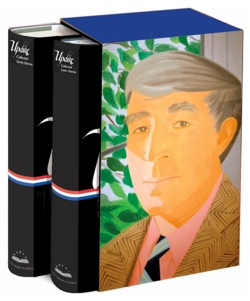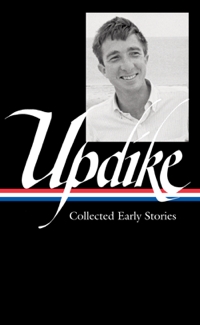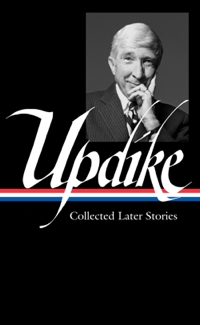 As much as Adam Begley’s forthcoming biography, Updike enthusiasts have been anticipating the September 12 publication of John Updike: The Collected Stories by the Library of America. The two volumes can be bought singly (John Updike: Collected Early Stories, John Updike: Collected Later Stories) or in a set that includes a sturdy and colorful slipcase designed by Chip Kidd, featuring the 1982 oil-on-canvas portrait by Alex Katz that’s housed at the National Portrait Gallery.
As much as Adam Begley’s forthcoming biography, Updike enthusiasts have been anticipating the September 12 publication of John Updike: The Collected Stories by the Library of America. The two volumes can be bought singly (John Updike: Collected Early Stories, John Updike: Collected Later Stories) or in a set that includes a sturdy and colorful slipcase designed by Chip Kidd, featuring the 1982 oil-on-canvas portrait by Alex Katz that’s housed at the National Portrait Gallery.
I received an advance copy of the set and am happy to report that it’s extremely well done. Christopher Carduff, who put together the special book publication of Hub Fan Bids Kid Adieu and edited Higher Gossip: Essays and Criticism (2011) and Always Looking: Essays on Art (2012), has arranged the stories in the order of their composition—a task made easier, Carduff writes, because “Updike signed a first-reading agreement” with The New Yorker when he was 22 years old and “habitually marked the date of submission on the first page of the typescript copy he kept for his files.” Almost all these typescripts from Updike’s personal files are now in the collection of Harvard’s Houghton Library.
The stories are presented here in their final definitive form, based on Carduff’s archival research and Updike’s own notes. In a “Note on the Texts” section at the back of each volume, Carduff lists the date of completion and first periodical publication for each story, as well as the books in which the story was collected. Here, for example, is the entry for the lead story in John Updike: Collected Early Stories:
“Ace in the Hole” was written in the fall of 1953 for English J, an advanced creative-writing class for Harvard upperclassmen taught by Albert J. Guerard. In the original version, the name of the protagonist was not Ace, but Flick, and “Flick” was the title of the story. On December 9, 1953, Updike, then a senior, submitted “Flick” to The New Yorker, which rejected it on March 18, 1954. After Katharine S. White, the head of the magazine’s fiction department, bought “Friends from Philadelphia” and some poems in the summer of 1954, Updike, while spending a postgraduate year in Oxford, England, revised the story and submitted it under the title “Ace in the Hole.” The story was accepted in January 1955 and was published in the issue of April 9, 1955. It was collected in The Same Door (1959) and The Early Stories (2003). The text from The Early Stories is used here.
Collected Early Stories begins with “Ace in the Hole” (1953) and ends with “Love Song, for a Moog Synthesizer” (1975), while Collected Later Stories is bookended by “Domestic Life in America” (1976) and “The Full Glass” (2008). There’s no introduction or foreword for either volume, but end matter includes a detailed “Chronology” (identical in each), a “Note on the Texts” section that offers details on the stories and lists omissions—“The Bech and Maples stories were written as episodes in an ongoing series, each installment a sequel to the last, and have been reserved for collection in a future Library of America volume”—and a “Notes” section that provides the equivalent of endnotes for specific stories.
In an email, Carduff said that the “Interviews with Insufficiently Famous Americans” series was omitted but will appear in a future LOA volume. With the further exception of the Bech and Maples stories, “all the stories that Updike gathered in his Knopf short-story collections are included, as are all the stories from his six nonfiction collections, three stories collected posthumously in Higher Gossip, and two stories that never made it into a trade book: ‘A Game of Botticelli’ (from The Liberal Context magazine) and ‘Part of the Process’ (from Special Reports: Fiction and the privately printed trio of stories called Love Factories). Juvenilia, undergraduate stories, and humor pieces and playlets had no place in this set: the LOA’s intention was to collect the official short-story canon as Updike himself defined it, plus a very few thrice-considered ‘extras.’”
As I said, it’s an attractive set that features 186 stories, all totaled, and seems certain to be accepted by scholars as the definitive critical text(s). The boxed set (volumes #242 and #243 in the Library of America series) runs 1,872 pages and comes with an SRP of $75. Amazon is currently accepting pre-orders for the discounted price of $49.83.


